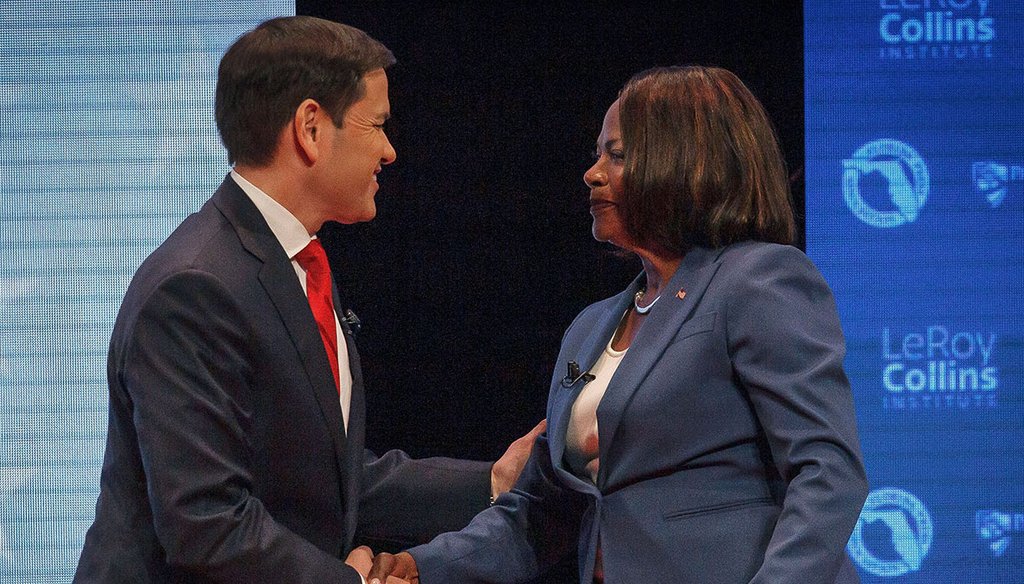Stand up for the facts!
Our only agenda is to publish the truth so you can be an informed participant in democracy.
We need your help.
I would like to contribute

Florida Senate candidates Marco Rubio and Val Demings shake hands before a televised debate Oct. 18 at the Duncan Theater on the campus of Palm Beach State College in Palm Beach County, Fla. (AP)
Republican incumbent Sen. Marco Rubio and his Democratic rival Rep. Val Demings took aggressive swipes at the other's credentials during their sole debate for Florida's U.S. Senate seat.
Rubio, first elected to the Senate in 2010, touted his foreign policy experience and legislative achievements over Demings' time in the lower chamber, quipping, "I was against Vladimir Putin before being against Vladimir Putin was cool." Demings, a former police chief elected to the House in 2016, said Rubio voted against the interests of Florida seniors and women with his stances on entitlement programs and abortion, adding that he knows nothing about "being there for people when they are in trouble."
PolitiFact's review of their comments turned up several claims that were false or not giving voters the full story.
Demings has sponsored two pieces of legislation that became law — a fact Rubio acknowledged, and dismissed, earlier in the debate. The bills renamed post office buildings, including one after Robert German, a Windermere, Florida, police officer who was shot and killed while working in 2014. It's worth noting that a member's effectiveness can also be assessed through co-sponsorships, writing language that ends up in other proposals, committee influence and constituent service.
Rubio is right that Demings agreed with 100% of votes taken by Pelosi since the 117th Congress began in 2021 — though it is a tradition of House speakers not to take many votes. Pelosi has participated in about 13% of the 925 votes in this session. The pair broke on more than 30 votes in the 2017-18 session.
Rubio snubbed calls from Democratic lawmakers to enact legislation restricting firearm sales after the May 24 elementary school shooting in Uvalde, Texas. He voted against a Senate amendment to the Bipartisan Safer Communities Act that would have restricted gun ownership by ex-convicts or those found by a court to be mentally ill.
But a broader look at his record shows Rubio in 2016 voted for a Republican bill that would place a hold on gun sales to people who were suspected terrorists.
He also supported legislation in 2019 to use federal funds to entice states to enact "red flag" laws, which allow law enforcement or family members to petition courts to temporarily remove firearms from people who pose a danger to themselves or others.
We rated a similar claim about Demings' support for elective abortion "up until birth" Mostly False. Demings supports abortion up to "viability," or when a fetus can survive outside the womb. Fetal viability is generally around 24 weeks into a pregnancy, according to the National Library of Medicine.
Demings has said she also supports abortion after fetal viability if the pregnancy "threatens the health of the woman," and voted for a bill that affirmed that stance. Abortions later in pregnancy are rare and involve maternal or fetal complications.
Demings voted to repeal the Hyde Amendment, which prohibits using federal dollars for abortion. However, the provision did not address at what stage of pregnancy a person can obtain an abortion.
It is true that Rubio does not support abortion, even in the cases of rape and incest, but he has voted on measures with those exceptions. In 2013, for example, Rubio co-sponsored a bill to bar access to abortion after 20 weeks of pregnancy; it included an exception for rape and incest. In a 2015 interview, Rubio said he compromised his view regarding those exceptions to "save lives in this country." He made the same point in the Oct. 18 debate.
Rubio also supports a proposal from Sen. Lindsey Graham, R-S.C., to prohibit abortion after 15 weeks of pregnancy with exceptions for rape and incest.
Like other Democrats, Demings supported the Freedom to Vote Act, which would expand the federal government's role in setting uniform rules like acceptable forms of voter ID. But most experts have told us that calling it a federal "takeover" is a mischaracterization because it would still leave many election administration powers held by state and local officials intact.
Early in his Senate career, Rubio supported a "premium support system" to give older Americans a fixed amount of money to purchase insurance from Medicare or a private provider. He voted for budgets that included reductions in future Medicare spending, which would have resulted in beneficiaries paying more out of pocket.
Rubio has long called for changes to Social Security and Medicare, as the programs face long-term financing shortfalls. However, PolitiFact did not find evidence of Rubio outright calling for either of the programs to be abolished.
Rubio's push to double the maximum child tax credit from $1,000 to $2,000 in the 2017 Tax Cuts and Jobs Act had the backing of White House adviser Ivanka Trump — though The Wall Street Journal editorial board was not a fan. In the lead-up to final passage, Rubio threatened to withhold his support unless negotiators allowed more lower-income American families who do not owe federal income taxes to claim up to $1,400 of the available credit. Republicans had voted down a similar amendment from Rubio during debate on the bill.
Demings was referring to provisions of the Inflation Reduction Act, which President Joe Biden signed into law in August. The law establishes the right for Medicare to negotiate prices with drugmakers on some medications, beginning in 2025. It also institutes a $35 monthly cap on insulin and a $2,000 out-of-pocket cap on prescription drugs for Medicare patients. The bill passed both chambers of Congress with only Democratic support.
RELATED: Marco Rubio on the Truth-O-Meter
RELATED: Val Demings on the Truth-O-Meter
Our Sources
See links in story.














































